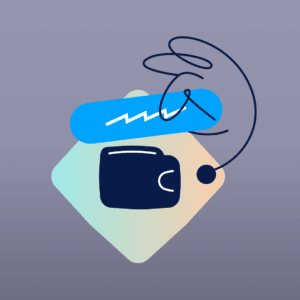16 Marketing Terms Every Business Owner Should Know

In today’s marketing world, it’s easy to get flustered with all the industry terminology. But not understanding these marketing terms and concepts can hinder your success.
Whether you’re a business owner or pro marketer, you want to get familiar with these ideas. Here are 16 digital marketing terms and concepts everyone should know for a successful tomorrow.
1. Audience segmentation
This is a marketing tactic that identifies and targets specific groups within an existing audience. Groups share certain characteristics or problems which you can tailor your content or product to fix.
The goal of audience segmentation is to personalize content and build stronger connects with prospects. You can base groups on anything from location to gender, age, purchasing behaviors, and so much more.
Related Reading:
- Audience Segmentation: What it is, How to Use It, and Examples
- How LogicBot Used ManyChat to Launch Mellanni’s New Product Line
2. Customer acquisition
Customer acquisition is the process of bringing new customers into your business. It includes every aspect of the buyers’ journey, from generation and acquisition through retention. The goal is to acquire new customers, delight loyal ones, and boost ROI for your business.
Companies both large and small should take a look at their acquisition strategy. You can identify what needs improvement, what content helps prospects convert, and how you can reduce churn rates. It’s also a key indicator for companies to determine the overall health of their business.
Related Reading:
- 5 Customer Acquisition Strategies that Actually Work
- 5 Messenger Marketing Blueprints to Generate Leads and Convert Customers
3. Messenger Marketing
Messenger Marketing is the process of generating interest in your products or services using Facebook Messenger, WhatsApp, Telegram, or other messaging apps. The goal is straightforward: improve customer relationships.
A Messenger Marketing strategy helps companies connect with the individual in a personal way, simplify processes, lower ad spend, and boost ROI.
Related Reading:
4. Messenger bot
A Messenger bot is a software that uses artificial intelligence to imitate human conversation. Marketers and business owners use them to assist lead generation, customer support, sales, inbound marketing efforts, and more.
You can use a Messenger bot to build relationships with prospects and customers on autopilot. Whether someone is a cold lead, prospect, or paid customers, you can offer content or 1:1 help throughout their buying journey. Companies also use Facebook Messenger bots to run giveaway campaigns and sell products — the possibilities are endless.
Related Reading:
5. Conversational commerce
Conversational commerce is a newer marketing term. It refers to the cross-section between eCommerce and conversation marketing via messaging apps like Messenger and WeChat, as well as voice recognition tech like Amazon Alexa.
Customers can talk with companies to get their problems solved, receive personalized recommendations, and even purchase products inside the chat window. Businesses use it to automate service conversations and talk with customers in real-time. This keeps customers inside the app and improves the chances of them making a purchase.
Related Reading:
6. A/B testing
If you were to take a marketing terms 101 class today, A/B testing would be a big element. It refers to comparing two variations of a single variable to decide which performs better. Variables can be design, messaging, CTAs — whatever ties back to your campaign goals.
Most people associate A/B testing with email marketing — in terms of trying different subject lines, CTA’s, and images. However, you can test many different assets such as landing pages, Messenger bot flows, and website copy.
Related Reading:
7. Qualified Lead
A qualified lead is someone who has chosen to receive communication from your company. They typically express interest in your product or service, and are interested in learning more. Companies who identify when a lead is qualified connect with prospects more often than those who don’t.
Related Reading:
- 10 Most Innovative Lead Generation Tools for 2019
- 11 Best Lead Generation Strategies to Try This Year
8. Conversation Qualified Lead (CQL)
A Conversational Qualified Lead (CQL) is a relatively new marketing idea. It’s given to prospects who’ve expressed an interest in your product or service during a chatbot conversation. You can discover more information about CQLs from recorded text conversations, buttons clicked, and other behavioral patterns in a flow.
Related Reading:
- 13 Chatbot Examples: Learn From the Best Chatbots in 2019
- How To Generate $250K with $0 Ad Spend [Jason Swenk Case Study]
9. General Data Protection Regulation (GDPR)
It’s important to know GDPR conditions when it comes to digital marketing communications. There are three high-level rules to understand for Messenger marketers:
- You must have a clear opt-in for user to give you permission to contact them.
- When someone opts-in, you must show them how to easily opt-out. Many bot builders use a variation of “Type STOP to unsubscribe …. “
- Lastly, you should be able to remove a user from your database.
Related Reading:
10. Remarketing
Remarketing refers to marketing to people who’ve interacted with your site or Messenger bot before, but didn’t buy anything. Marketers take any captured information from a user’s session and use it to send ads or sponsored messages that encourage action. You can also remarket to current customers to up-sell or cross-sell items that complement their original purchase on different media platforms.
Related Reading:
- 4 Steps to Build a Profitable eCommerce Funnel
- How to Retarget Messenger Bot Subscribers with Facebook Ads
11. Application Programming Interface (API)
APIs refer to a set of rules that allow software components to communicate with each other. It’s like a messenger who runs information back and forth between different software.
For example, when you search for a hotel room by city online, the travel site connects to each hotel’s API to show you open rooms and info. It enables marketers to use different software in their campaigns to create more personalized experiences for customers.
Related Reading:
12. Conversion Rate Optimization (CRO)
Conversion rate optimization sounds scarier than it actually is. It refers to continually analyzing user interactions — such as click-through rate or bounce rates — and making improvements to increase conversions. It helps you lower customer acquisition costs and get more value from the customers you already have.
Related Reading:
- 10 Conversion Rate Optimization Best Practices
- What to Do if User’s Don’t Click Your Bots Buttons
- How Gustavo Boregio Improved Online Course Conversion Rates by 2900%
13. Cost per Lead (CPL)
Cost per Lead refers to how much you pay for an opt-in from interested consumers. It’s a key metric to determine if your lead generation campaign is performing well or not.
Related Reading:
- 9 High-Converting Lead Generation Examples to Steal in 2019
- How TEDxMileHigh Saw 5X ROAS Using ManyChat to Boost Ticket Sales
14. Key Performance Indicator (KPI)
KPI’s track measurable progress of how effectively your company achieves its business objectives. It can be related to marketing, sales, customer support, or finance and accounting — really any department. If you fail to set realistic KPIs, you risk missing opportunities to improve performance and reduce different costs.
Related Reading:
15. Drip Campaign
Drip campaigns refer to any automated sequence that engages customers after they’ve completed an action — like Messenger bot subscribe or webinar sign-up. It’s usually associated with email marketing, but with the rise of mobile marketing, Messenger and text marketing are also powered by automated communications. Marketers often segment groups to send targeted, more relevant messages in order to improve conversion rates.
Related Reading:
16. Chat Marketing
Chat Marketing is a marketing strategy to help promote and sell products and services through conversational channels including Messenger, SMS, WeChat, and other 1:1 chat apps. It encompasses all aspects of business, and informs everyone from marketing to sales and customer success teams.
Chat Marketing looks at the entire customer lifecycle. It’s about seeing how and where you can create conversations that encourage more committed customers from lead generation to acquisition and retention.
Related Reading:
- What is Chat Marketing? [Infographic]
- How to Build a Successful Chat Marketing Strategy
- The Unrivaled Guide to Chat Marketing
Put these 16 digital marketing terms into action for your business.
Knowing basic marketing terms and how to use them can help you take your marketing game one step further. You can better understand how to target your customers and create a wealth of leads from your conversations with them.
By using a range of diverse strategies and tactics, you’ll get a more rounded view of your customers, and will be able to optimize your marketing assets to make an impact on your business.








